标签:.com range 程序 支持 pac 专用 常用 argc 引用
异常的概念:
异常(Exception)与 Bug 的对比:
异常处理的方式:
C语言经典处理方式:if ... else ...
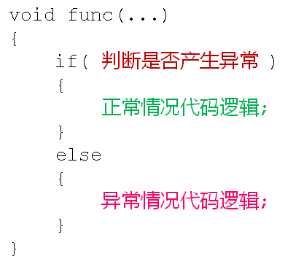
示例——除法操作异常处理:
#include <iostream>
using namespace std;
double divide(double a, double b, int* valid)
{
const double delta = 0.000000000000001;
double ret = 0;
if( !((-delta < b) && (b < delta)) )
{
ret = a / b;
*valid = 1;
}
else
{
*valid = 0;
}
return ret;
}
int main(int argc, char *argv[])
{
int valid = 0;
double r = divide(1, 0, &valid);
if( valid )
{
cout << "r = " << r << endl;
}
else
{
cout << "Divided by zero..." << endl;
}
return 0;
}运行结果为:
[root@bogon Desktop]# g++ test.cpp
[root@bogon Desktop]# ./a.out
Divided by zero...缺陷:
通过 setjmp() 和 longjmp() 进行优化:
int setjmp(jmp_buf env)
void longjmp(jmp_buf env, int val)
示例——除法操作异常处理优化:
#include <iostream>
#include <csetjmp>
using namespace std;
static jmp_buf env;
double divide(double a, double b)
{
const double delta = 0.000000000000001;
double ret = 0;
if( !((-delta < b) && (b < delta)) )
{
ret = a / b;
}
else
{
longjmp(env, 1);
}
return ret;
}
int main(int argc, char *argv[])
{
if( setjmp(env) == 0 )
{
double r = divide(1, 0);
cout << "r = " << r << endl;
}
else
{
cout << "Divided by zero..." << endl;
}
return 0;
}运行结果为:
[root@bogon Desktop]# g++ test.cpp
[root@bogon Desktop]# ./a.out
Divided by zero...setjmp() 和 longjmp() 的引入:
C语言中的经典异常处理方式会使得程序中逻辑中混入大量的处理异常的代码。
正常逻辑代码和异常处理代码混合在一起,导致代码迅速膨胀,难以维护。。。
示例——异常处理代码分析:
#include <iostream>
using namespace std;
#define SUCCESS 0
#define INVALID_POINTER -1
#define INVALID_LENGTH -2
#define INVALID_PARAMETER -3
int MemSet(void* dest, unsigned int length, unsigned char v)
{
if( dest == NULL )
{
return INVALID_POINTER;
}
if( length < 4 )
{
return INVALID_LENGTH;
}
if( (v < 0) || (v > 9) )
{
return INVALID_PARAMETER;
}
unsigned char* p = (unsigned char*)dest;
for(int i=0; i<length; i++)
{
p[i] = v;
}
return SUCCESS;
}
int main(int argc, char *argv[])
{
int ai[5];
int ret = MemSet(ai, sizeof(ai), 0);
if( ret == SUCCESS )
{
}
else if( ret == INVALID_POINTER )
{
}
else if( ret == INVALID_LENGTH )
{
}
else if( ret == INVALID_PARAMETER )
{
}
return ret;
}C++内置了异常处理的语法元素try ... catch ...:
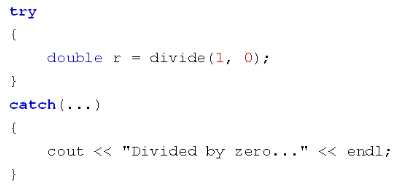
C++通过throw语句抛出异常信息:
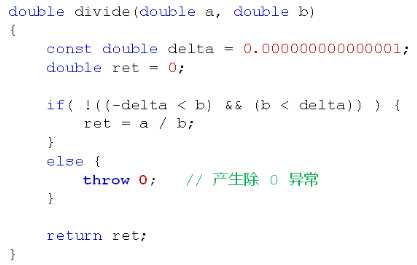
throw抛出的异常必须被catch处理:
未被处理的异常会顺着函数调用栈向上传播,直到被处理为止,否则程序将停止执行。
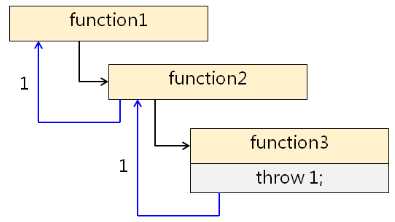
示例——C++异常处理:
#include <iostream>
using namespace std;
double divide(double a, double b)
{
const double delta = 0.000000000000001;
double ret = 0;
if( !((-delta < b) && (b < delta)) )
{
ret = a / b;
}
else
{
throw 0;
}
return ret;
}
int main(int argc, char *argv[])
{
try
{
double r = divide(1, 0);
cout << "r = " << r << endl;
}
catch(...)
{
cout << "Divided by zero..." << endl;
}
return 0;
}运行结果为:
[root@bogon Desktop]# g++ test.cpp
[root@bogon Desktop]# ./a.out
Divided by zero...同一个try语句可以跟上多个catch语句:
异常处理的匹配规则:
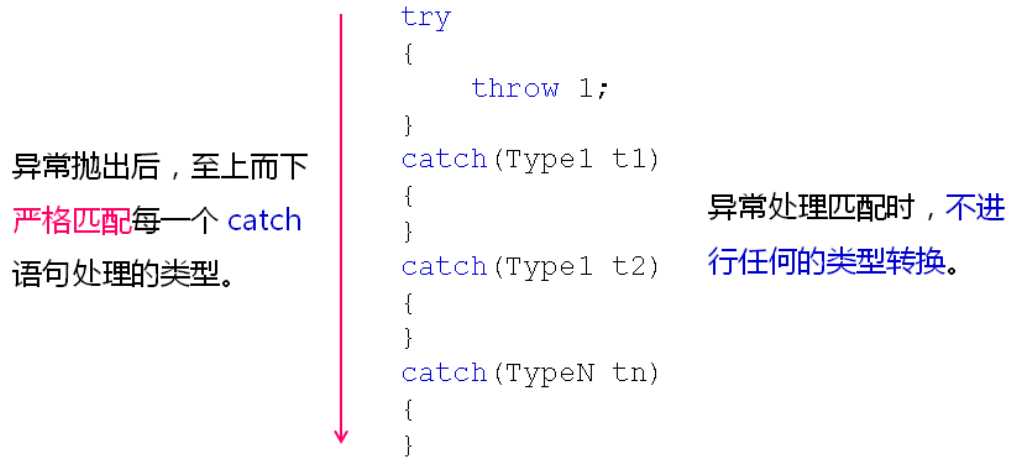
示例——异常类型匹配:
#include <iostream>
using namespace std;
void Demo1()
{
try
{
throw ‘c‘;
}
catch(char c)
{
cout << "catch(char c)" << endl;
}
catch(short c)
{
cout << "catch(short c)" << endl;
}
catch(double c)
{
cout << "catch(double c)" << endl;
}
catch(...)
{
cout << "catch(...)" << endl;
}
}
void Demo2()
{
throw string("HelloWorld!");
}
int main(int argc, char *argv[])
{
Demo1();
try
{
Demo2();
}
catch(char* s)
{
cout << "catch(char *s)" << endl;
}
catch(const char* cs)
{
cout << "catch(const char *cs)" << endl;
}
catch(string ss)
{
cout << "catch(string ss)" << endl;
}
return 0;
}运行结果为:
[root@bogon Desktop]# g++ test.cpp
[root@bogon Desktop]# ./a.out
catch(char c)
catch(string ss)catch语句块中可以抛出异常:
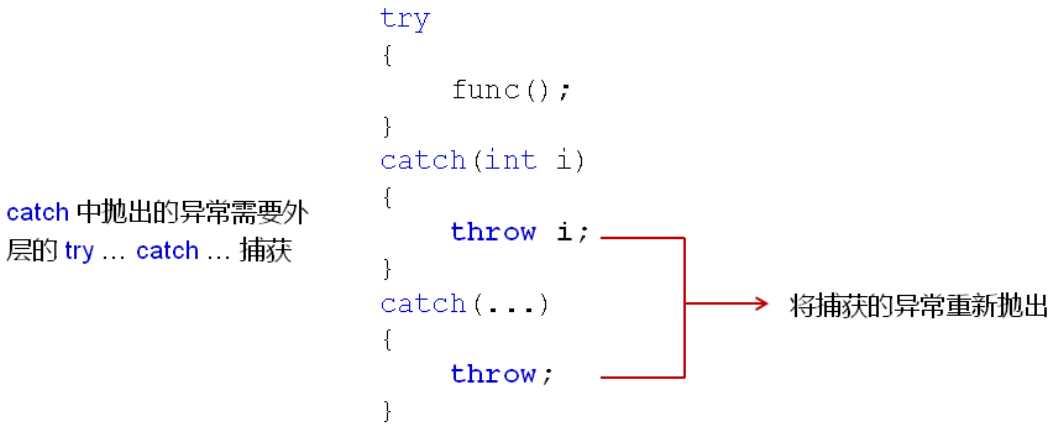
为什么要在catch中重新抛出异常?
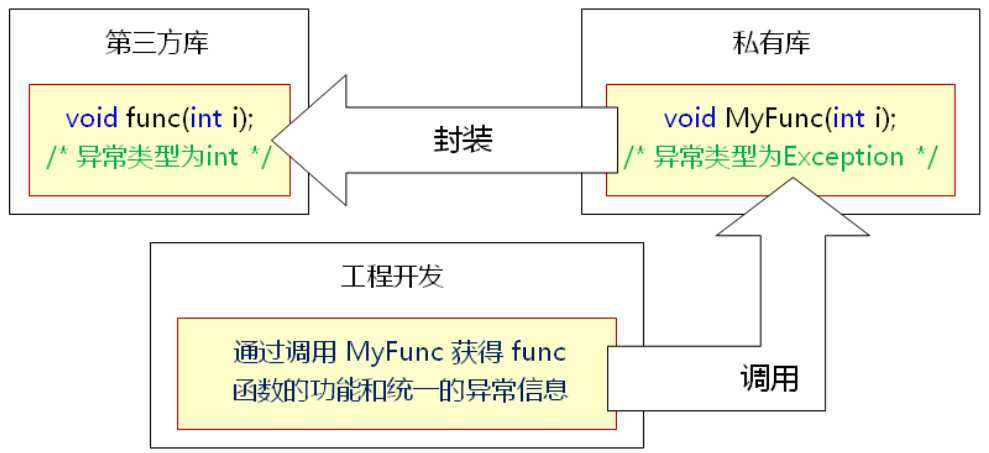
示例——在catch中重新抛出异常:
#include <iostream>
using namespace std;
void Demo()
{
try
{
try
{
throw ‘c‘;
}
catch(int i)
{
cout << "Inner: catch(int i)" << endl;
throw i;
}
catch(...)
{
cout << "Inner: catch(...)" << endl;
throw;
}
}
catch(...)
{
cout << "Outer: catch(...)" << endl;
}
}
int main(int argc, char *argv[])
{
Demo();
return 0;
}运行结果为:
[root@bogon Desktop]# g++ test.cpp
[root@bogon Desktop]# ./a.out
Inner: catch(...)
Outer: catch(...)示例——异常的重新解释:
#include <iostream>
using namespace std;
/*
假设: 当前的函数式第三方库中的函数,因此,我们无法修改源代码
函数名: void func(int i)
抛出异常的类型: int
-1 ==》 参数异常
-2 ==》 运行异常
-3 ==》 超时异常
*/
void func(int i)
{
if( i < 0 )
{
throw -1;
}
if( i > 100 )
{
throw -2;
}
if( i == 11 )
{
throw -3;
}
cout << "Run func..." << endl;
}
void MyFunc(int i)
{
try
{
func(i);
}
catch(int i)
{
switch(i)
{
case -1:
throw "Invalid Parameter";
break;
case -2:
throw "Runtime Exception";
break;
case -3:
throw "Timeout Exception";
break;
}
}
}
int main(int argc, char *argv[])
{
try
{
MyFunc(11);
}
catch(const char* cs)
{
cout << "Exception Info: " << cs << endl;
}
return 0;
}运行结果为:
[root@bogon Desktop]# g++ test.cpp
[root@bogon Desktop]# ./a.out
Exception Info: Timeout ExceptionC++中的异常处理:
(根据赋值兼容性原则:子类的异常对象可以被父类的catch语句块抓住。)
C++中的异常处理:
示例——类类型的异常:
#include <iostream>
using namespace std;
class Base
{
};
class Exception : public Base
{
int m_id;
string m_desc;
public:
Exception(int id, string desc)
{
m_id = id;
m_desc = desc;
}
int id() const
{
return m_id;
}
string description() const
{
return m_desc;
}
};
/*
假设: 当前的函数式第三方库中的函数,因此,我们无法修改源代码
函数名: void func(int i)
抛出异常的类型: int
-1 ==》 参数异常
-2 ==》 运行异常
-3 ==》 超时异常
*/
void func(int i)
{
if( i < 0 )
{
throw -1;
}
if( i > 100 )
{
throw -2;
}
if( i == 11 )
{
throw -3;
}
cout << "Run func..." << endl;
}
void MyFunc(int i)
{
try
{
func(i);
}
catch(int i)
{
switch(i)
{
case -1:
throw Exception(-1, "Invalid Parameter");
break;
case -2:
throw Exception(-2, "Runtime Exception");
break;
case -3:
throw Exception(-3, "Timeout Exception");
break;
}
}
}
int main(int argc, char *argv[])
{
try
{
MyFunc(11);
}
catch(const Exception& e)
{
cout << "Exception Info: " << endl;
cout << " ID: " << e.id() << endl;
cout << " Description: " << e.description() << endl;
}
catch(const Base& e)
{
cout << "catch(const Base& e)" << endl;
}
return 0;
}运行结果为:
[root@bogon Desktop]# g++ test.cpp
[root@bogon Desktop]# ./a.out
Exception Info:
ID: -3
Description: Timeout ExceptionC++中的异常处理:
标准库中的异常:
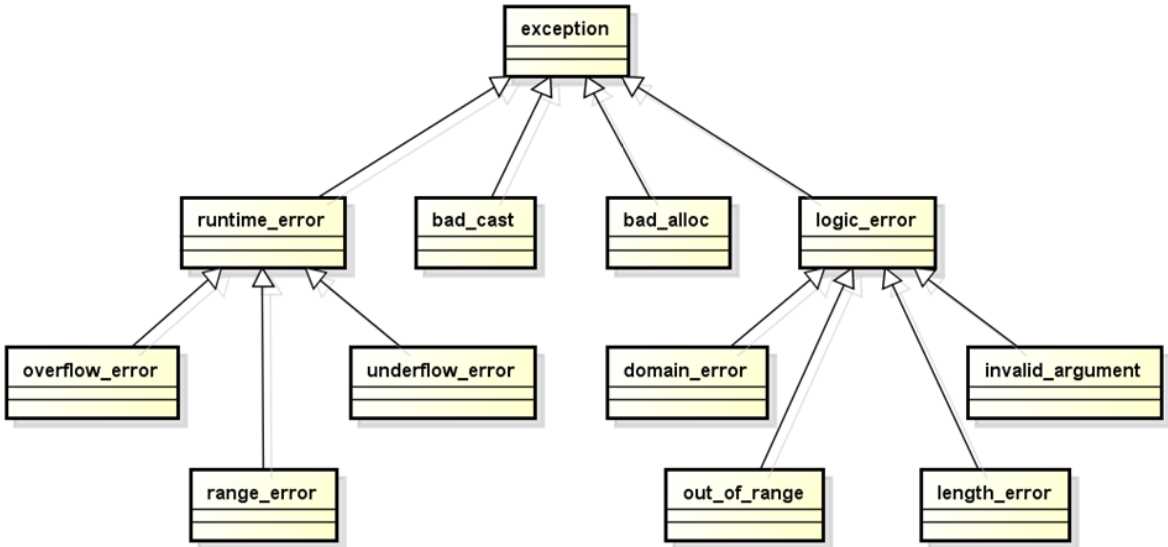
示例——标准库中的异常使用(优化之前的Array.h和HeapArray.h):
// Array.h
#ifndef _ARRAY_H_
#define _ARRAY_H_
#include <stdexcept>
using namespace std;
template
< typename T, int N >
class Array
{
T m_array[N];
public:
int length() const;
bool set(int index, T value);
bool get(int index, T& value);
T& operator[] (int index);
T operator[] (int index) const;
virtual ~Array();
};
template
< typename T, int N >
int Array<T, N>::length() const
{
return N;
}
template
< typename T, int N >
bool Array<T, N>::set(int index, T value)
{
bool ret = (0 <= index) && (index < N);
if( ret )
{
m_array[index] = value;
}
return ret;
}
template
< typename T, int N >
bool Array<T, N>::get(int index, T& value)
{
bool ret = (0 <= index) && (index < N);
if( ret )
{
value = m_array[index];
}
return ret;
}
template
< typename T, int N >
T& Array<T, N>::operator[] (int index)
{
if( (0 <= index) && (index < N) )
{
return m_array[index];
}
else
{
throw out_of_range("T& Array<T, N>::operator[] (int index)");
}
}
template
< typename T, int N >
T Array<T, N>::operator[] (int index) const
{
if( (0 <= index) && (index < N) )
{
return m_array[index];
}
else
{
throw out_of_range("T Array<T, N>::operator[] (int index) const");
}
}
template
< typename T, int N >
Array<T, N>::~Array()
{
}
#endif// HeapArray.h
#ifndef _HEAPARRAY_H_
#define _HEAPARRAY_H_
#include <stdexcept>
using namespace std;
template
< typename T >
class HeapArray
{
private:
int m_length;
T* m_pointer;
HeapArray(int len);
HeapArray(const HeapArray<T>& obj);
bool construct();
public:
static HeapArray<T>* NewInstance(int length);
int length() const;
bool get(int index, T& value);
bool set(int index ,T value);
T& operator [] (int index);
T operator [] (int index) const;
HeapArray<T>& self();
const HeapArray<T>& self() const;
~HeapArray();
};
template
< typename T >
HeapArray<T>::HeapArray(int len)
{
m_length = len;
}
template
< typename T >
bool HeapArray<T>::construct()
{
m_pointer = new T[m_length];
return m_pointer != NULL;
}
template
< typename T >
HeapArray<T>* HeapArray<T>::NewInstance(int length)
{
HeapArray<T>* ret = new HeapArray<T>(length);
if( !(ret && ret->construct()) )
{
delete ret;
ret = 0;
}
return ret;
}
template
< typename T >
int HeapArray<T>::length() const
{
return m_length;
}
template
< typename T >
bool HeapArray<T>::get(int index, T& value)
{
bool ret = (0 <= index) && (index < length());
if( ret )
{
value = m_pointer[index];
}
return ret;
}
template
< typename T >
bool HeapArray<T>::set(int index, T value)
{
bool ret = (0 <= index) && (index < length());
if( ret )
{
m_pointer[index] = value;
}
return ret;
}
template
< typename T >
T& HeapArray<T>::operator [] (int index)
{
if( (0 <= index) && (index < length()) )
{
return m_pointer[index];
}
else
{
throw out_of_range("T& HeapArray<T>::operator [] (int index)");
}
}
template
< typename T >
T HeapArray<T>::operator [] (int index) const
{
if( (0 <= index) && (index < length()) )
{
return m_pointer[index];
}
else
{
throw out_of_range("T HeapArray<T>::operator [] (int index) const");
}
}
template
< typename T >
HeapArray<T>& HeapArray<T>::self()
{
return *this;
}
template
< typename T >
const HeapArray<T>& HeapArray<T>::self() const
{
return *this;
}
template
< typename T >
HeapArray<T>::~HeapArray()
{
delete[]m_pointer;
}
#endif// test.cpp
#include <iostream>
#include "Array.h"
#include "HeapArray.h"
using namespace std;
void TestArray()
{
Array<int, 5> a;
for(int i=0; i<a.length(); i++)
{
a[i] = i;
}
for(int i=0; i<a.length(); i++)
{
cout << a[i] << endl;
}
}
void TestHeapArray()
{
HeapArray<double>* pa = HeapArray<double>::NewInstance(5);
if( pa != NULL )
{
HeapArray<double>& array = pa->self();
for(int i=0; i<array.length(); i++)
{
array[i] = i;
}
for(int i=0; i<array.length(); i++)
{
cout << array[i] << endl;
}
}
delete pa;
}
int main(int argc, char *argv[])
{
try
{
TestArray();
cout << endl;
TestHeapArray();
}
catch(...)
{
cout << "Exception" << endl;
}
return 0;
}运行结果为:
[root@bogon Desktop]# g++ test.cpp
[root@bogon Desktop]# ./a.out
0
1
2
3
4
0
1
2
3
4标签:.com range 程序 支持 pac 专用 常用 argc 引用
原文地址:https://www.cnblogs.com/PyLearn/p/10094869.html